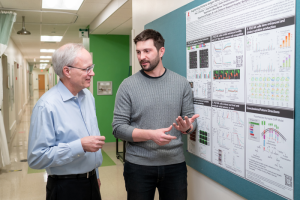Life Sciences
Molecular Anchor Creates More Effective CAR T Immunotherapies
Chimeric antigen receptor (CAR) technologies have been clinically implemented for treatment of hematological malignancies; however, solid tumors remain…

A team at St. Jude Children’s Research Hospital reports that adding a molecular anchor to the key protein used to recognize cancer in cellular immunotherapies can make the treatments significantly more effective. The scientists found that immune cells with the anchored protein increased cancer killing, regardless of their cell type or the kind of cancer targeted.
The molecular anchor concept is a new design for improving chimeric antigen receptor (CAR)-based-immunotherapies. CARs have shown some promise in the clinic, but have yet to deliver widespread success across tumor types. The findings “Synapse-tuned CARs enhance immune cell anti-tumor activity” appear in Nature Biotechnology.

“Chimeric antigen receptor (CAR) technologies have been clinically implemented for the treatment of hematological malignancies; however, solid tumors remain resilient to CAR therapeutics. Natural killer (NK) cells may provide an optimal class of immune cells for CAR-based approaches due to their inherent anti-tumor functionality,” write the investigators.
“In this study, we sought to tune CAR immune synapses by adding an intracellular scaffolding protein binding site to the CAR. We employ a PDZ binding motif (PDZbm) that enables additional scaffolding crosslinks that enhance synapse formation and NK CAR cell polarization. Combined effects of this CAR design result in increased effector cell functionality in vitro and in vivo.
Similar global enhancements
“Additionally, we used T cells and observed similar global enhancements in effector function. Synapse-tuned CAR immune cells exhibit amplified synaptic strength, number, and abundance of secreted cytokines, enhanced killing of tumor cells and prolonged survival in numerous different tumor models, including solid tumors.”
“We’ve come up with a new way to more efficiently and effectively bind and target cancer cells,” said first and corresponding author Peter Chockley, PhD, St. Jude Department of Bone Marrow Transplantation and Cellular Therapy. “The anchor domain design is modular, universal and cross-species. We showed it worked in multiple CARs and multiple immune cell types, including both Natural Killer (NK) and T cells.”
CAR T cells have failed to deliver for solid tumors, due partially to problems with immune cell activation. The St. Jude group found a way to “anchor” the CAR molecule within immune cells, allowing the cells to become activated more easily and kill cancer more effectively than conventional CARs. The anchored CARs increased survival in animal models of multiple tumor types, including lung, bone, and brain cancers.
The anchor domain discovery is easily translatable into early phase clinical testing,” said senior author Stephen Gottschalk, MD, St. Jude Department of Bone Marrow Transplantation and Cellular Therapy chair. “It doesn’t require any other new technology. We strongly believe that this approach needs to get tested in the clinic because no one has tried it before, and it looks very promising in our preclinical work.”
Carefully structured CARs kill cancers better
“Our approach is different because it focuses on organization,” according to Peter Chockley. “CAR structure, when it forms the immune synapse, is very disorganized. The anchoring domain we added organizes the internal scaffolding and makes a better signal, and then brings in other more natural adaptor signaling proteins. The simple addition of organization improves CARs dramatically.”
“The most attractive thing about this approach,” pointed out Gottschalk, “Is that you can put it into any CAR you like. The engineering is simple and easily translatable into lots of different systems.”
The scientists added the molecular anchor by including just four extra amino acids to the end of the conventional CAR. These amino acids then bound the protein Scribble, which is involved in signaling and attaching to the internal structure of the cell. The proteins, amino acids, and signaling involved would be familiar to those working in epithelial cells, but not necessarily to an immunologist working on CARs.
“There’s a lot more to an immune cell-cancer cell interaction than we’ve been working with,” Chockley said. “We’re entering a new design realm with this domain. We have plenty to do now. There’s a lot to explore.”
The post Molecular Anchor Creates More Effective CAR T Immunotherapies appeared first on GEN – Genetic Engineering and Biotechnology News.

Wittiest stocks:: Avalo Therapeutics Inc (NASDAQ:AVTX 0.00%), Nokia Corp ADR (NYSE:NOK 0.90%)
There are two main reasons why moving averages are useful in forex trading: moving averages help traders define trend recognize changes in trend. Now well…
Spellbinding stocks: LumiraDx Limited (NASDAQ:LMDX 4.62%), Transocean Ltd (NYSE:RIG -2.67%)
There are two main reasons why moving averages are useful in forex trading: moving averages help traders define trend recognize changes in trend. Now well…
Asian Fund for Cancer Research announces Degron Therapeutics as the 2023 BRACE Award Venture Competition Winner
The Asian Fund for Cancer Research (AFCR) is pleased to announce that Degron Therapeutics was selected as the winner of the 2023 BRACE Award Venture Competition….














